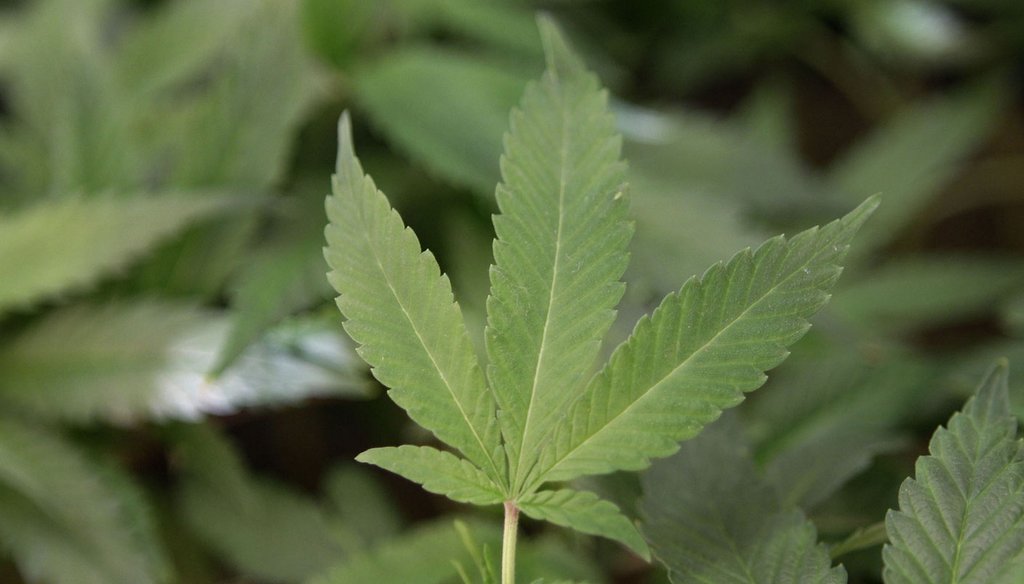

Our only agenda is to publish the truth so you can be an informed participant in democracy.
We need your help.


Marijuana leaf (AP photo)
Vigorous debate surrounds efforts to legalize marijuana around the nation and in Rhode Island, where advocates are pushing legalization proposals in the General Assembly.
(In 2013, the state decriminalized possession of small amounts of non-medical marijuana.)
Author Susan Shapiro, who says she is ambivalent about legalizing marijuana, shared her story about what she called her "extreme addiction" to marijuana in a commentary published Jan. 10, 2015, in The Providence Journal entitled "Susan Shapiro: My pot addiction nearly ruined my life."
She told of marijuana’s "dark side," and included statistics to reinforce her point. "The 2012 National Survey on Drug Use and Health found that up to half of daily marijuana smokers become addicted -- an estimated 2.7 million people in the U.S," she wrote.
We wondered if the figure Shapiro used is true.
We called her to find out how she backed up her claim. She referred us to a story that ran July 14, 2014, in USA Today entitled "Marijuana poses more risks than many realize" by reporter Liz Szabo. She took the information from that piece, she said.
The story quoted Nora D. Volkow, director of the National Institute of Drug Abuse, a federal agency that supports research on drug abuse and addiction.
The relevant section in the story Shapiro cited reads: "Up to half of people who smoke marijuana daily become addicted. According to the 2012 National Survey on Drug Use and Health, 2.7 million people over age 12 meet criteria for addiction to marijuana."
We contacted the Substance Abuse and Mental Health Services Administration (SAMHSA), which produced the survey cited by Shapiro and Volkow. We also reached out to Volkow’s organization, the National Institute on Drug Abuse (NIDA).
The SAMHSA survey found that 5.4 million people said they used marijuana daily or almost daily in 2012. Almost daily was defined as 300 or more days in the past year. (Another 18.9 million said they had used marijuana at least once in the past month.)
NIDA forwarded us a detailed table from the SAMHSA’s 2012 National Survey on Drug Use and Health. It showed that 2.69 million people over age 12 with dependence on marijuana and hashish in the past year. That’s roughly half the number of daily marijuana smokers, as Shapiro said.
Tamara Ward, a SAMHSA spokeswoman, told us that dependence on illicit drugs or alcohol is defined as meeting three out of seven criteria in the Diagnostic and Statistical Manual of Mental Disorders IV, including the need for markedly increased amounts of the substance, withdrawal symptoms, and reduction or abandonment of social, work or recreational activities because of use.
That sounded like addiction to us, but to be sure, we also reached out to Wayne D. Hall, a professor and director of the Centre for Youth Substance Abuse Research at the University of Queensland, in Australia.
We asked Hall if dependence amounted to addiction. He said he used the words interchangeably but that not everyone does, especially not in the case of opioid drugs.
We also contacted Dr. Stuart Gitlow, an addiction medicine specialist in Woonsocket and president of the American Society of Addiction Medicine. He agreed.
"Clearly, all those who have dependence also have addiction, but it's not as clear that all those with abuse also have addiction. Some probably do not," Gitlow said.
Our ruling
Susan Shapiro wrote "The 2012 National Survey on Drug Use and Health found that up to half of daily marijuana smokers become addicted -- an estimated 2.7 million people in the U.S."
The survey found that 5.4 million people reported using marijuana daily or almost daily. A more detailed table from the same survey shows 2.69 million people -- just shy of 2.7 million -- with dependence on marijuana and hashish.
Based on that number, and the definitions of addiction from SAMHSA, Hall and Gitlow, we rate Shapiro’s claim True.
(Correction: Susan Shapiro says she is ambivalent about legalizing marijuana. The original version of this item and the headline incorrectly said she opposes legalization.)
Interview, Susan Shapiro, Jan. 20, 2015
The Providence Journal, "Susan Shapiro: My pot addiction nearly ruined my life," Jan. 10, 2015
The Providence Journal, "R.I. group plans push for marijuana legalization in 2015," Nov. 7, 2014
USA Today, "Marijuana poses more risks than many realize," Liz Szabo, July 14, 2014
E-mails, National Institute on Drug Abuse, Jan. 20-Feb. 2, 2015
2012 National Survey on Drug Use and Health, Substance Abuse and Mental Health Services Administration, accessed Jan. 20, 2015
Interview and emails, Tamara Ward, Substance Abuse and Mental Health Services Administration spokeswoman, Jan. 22-30, 2015
The International Journal of Drug Policy, Volume 20, issue 6, "The adverse health effects of cannabis use: What are they, and what are their implications for police," November 2009, by Wayne D. Hall, professor at the University of Queensland, accessed Jan. 22, 2015
The Lancet, "Adverse health effects of non-medical cannabis use," by Wayne D. Hall, October 2009, accessed Jan. 22, 2015
Addiction Science & Clinical Practice, "Marijuana Dependence and Its Treatment," by Alan J. Budney, Roger Roffman, Robert S. Stephens, Denise Walker, December 2007, accessed Jan. 22, 2015
Diagnostic and Statistical Manual of Mental Disorders IV, "Criteria for Substance Abuse/Dependency," accessed Jan. 22, 2015
Neuropsychopharmocology, "From First Drug Use to Drug Dependence: Developmental Periods of Risk for Dependence upon Marijuana, Cocaine, and Alcohol," 2002, by Fernando A Wagner and James C. Anthony, accessed Jan. 22, 2015
Drug Testing and Analysis, "The adverse health effects of chronic cannabis use, Drug Testing and Analysis," April 2013, by Wayne D. Hall and Louisa Degenhardt, accessed Jan. 23, 2015
E-mails, Wayne D. Hall, Jan. 22-28, 2015
E-mails, Dr. Stuart Gitlow, Jan. 23-30, 2015
In a world of wild talk and fake news, help us stand up for the facts.
